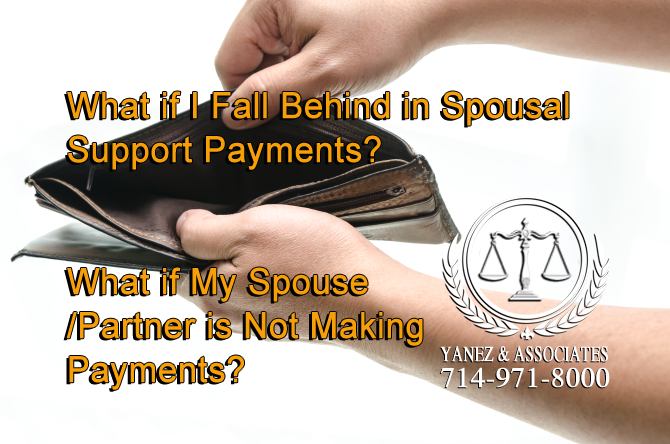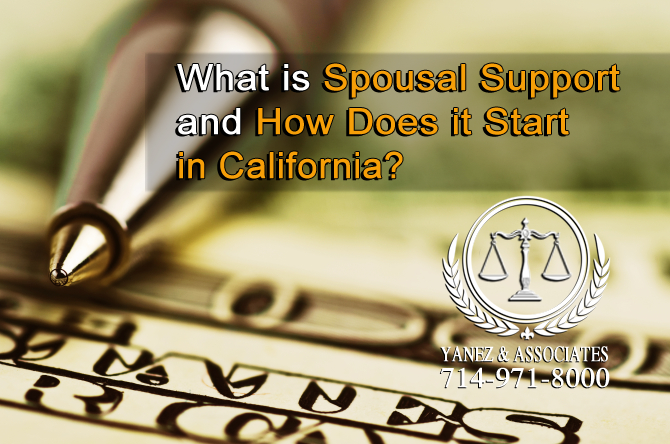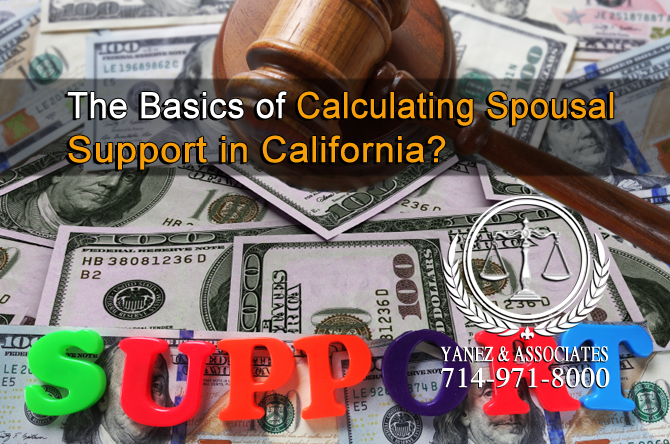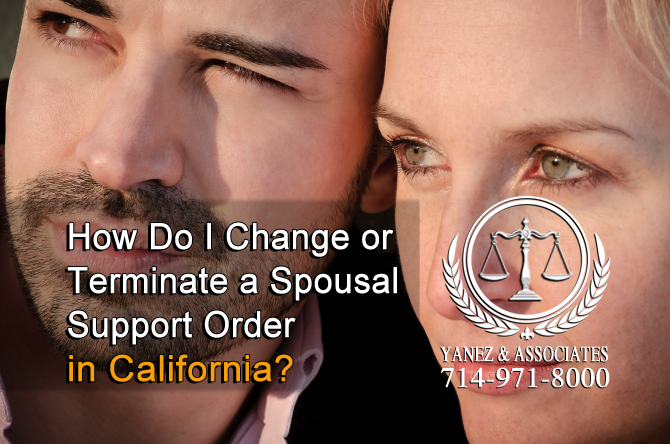Spousal Support FAQ: What is Spousal Support and How Does it Start in Orange County, California?
Orange County Spousal Support Attorney
In California, when a couple gets either a divorce or a legal separation, the court has the option to include a support order. When a married couple is filing for divorce or legal separation, this order is called spousal support, and when a registered domestic partnership ends in divorce or legal separation, this order is called a partner support order.
Spousal support orders and partner support orders are intended to allow both spouses or partners to walk away from a marriage or registered domestic partnership and maintain a standard of living similar to that which was established during the marriage or partnership. This is done by requiring one partner or spouse to send support payments to the other for a set period of time.
Understanding the laws surrounding spousal and partner support can be difficult, but it does not have to be. Divorce and legal separation are both life-changing events; they affect your personal life, your living situation, your family, your friends, and your finances. It is important to look at all of your options, including spousal support, with the help of a qualified family lawyer.
What is Spousal Support and How Does it Start?
Spousal support and partner support can also be called alimony. These are different names for court orders that require one spouse or partner, or former spouse or partner, to make support payments to the other one so that both parties are able to maintain a standard of living similar to what was established during the marriage or registered domestic partnership.
Spousal support can only begin during a specific kind of open family law court case. You can ask for a spousal support order during the following kinds of family law cases:
• Divorce
• Legal Separation
• Annulment
• Domestic Violence Restraining Orders
There are a couple of different kinds of spousal support or partner support orders that you can request during these court cases.
Usually, while the case is going on, one party can ask for something called temporary spousal support or temporary partner support. This is especially important during contested divorces or domestic violence restraining order cases to ensure that one party does not have more control or unfair control over shared finances throughout the duration of an open court case. It also allows both parties to continue paying shared bills, and to pay for their living expenses until a final decision can be made.
The other kind of partner support or spousal support is called permanent or long-term support. Depending on the length of the marriage or registered domestic partnership, support payments may be required for different lengths of time. The longer the marriage or registered domestic partnership, the longer support payments are likely to be required.
The Basics of Calculating Spousal Support
Calculating spousal support can be one of the most difficult pieces of a spousal or partner support order. Temporary spousal and partner support orders are usually calculated according to a formula that can vary by county. If you have questions about how temporary support orders are calculated and issued in your county, speak with a family law attorney. The point of temporary support orders is that they go into effect quickly, so it is best to work with a professional.
There is no formula used when calculating long term or permanent spousal support. Instead, there are certain factors that a judge will need to consider according to California Family Code Section 4320. These factors include the following:
• The earning capacity of both parties, and whether each party is capable of maintaining the standard of living that was established during the marriage or registered domestic partnership,
• The marketable skills of each the party who will receive support, including the job market for those skills and any training or education needed to enter the job market successfully,
• How any contribution to the marriage or children, including periods of unemployment, may affect either party’s ability to obtain gainful employment,
• The extent to which one party contributed to the education, training, career, or licensing of the other,
• The ability of the paying party to pay spousal or partner support,
• The needs of both parties and their established standard of living,
• Financial obligations and assets of both parties,
• The length of the marriage,
• How any children will affect the dependent party’s ability to obtain employment,
• The age and health of both partners or spouses,
• Any history of domestic violence or abuse,
• The tax consequences to both parties, and other hardships or benefits either party may face,
• The length of time that it may require for both parties to become financially independent.
Because these factors can vary so much from one couple to another, spousal support is not the same for everyone. If you have questions about how to prepare for spousal support or how to gather information for your spousal support case, a family lawyer in your area is your best resource.
How Do I Change or Terminate a Spousal Support Order?
It is possible for spousal support or partner support orders to change after they have been issued. A change to a spousal or partner support order is called a modification, and a process exists in California to request a support order modification.
Either party can ask for a modification to a partner or spousal support order. However, in order to successfully obtain a modification, there needs to have been a change in circumstances that warrants it. This just means that something significant needs to have happened since the original support order was issued. Usually, something that affects the factors that play into the support calculation will change. For example, if one the supporting party loses his or her job, that party may no longer be able to afford support payments. Or, if the receiving party obtains gainful employment, support payments may no longer be necessary.
If you need to modify your support order, always contact an attorney as soon as possible. Even if you think that you will find a new job soon, you have other things to worry about, or you are in a situation where it is difficult to deal with, modifying your alimony order should be a priority. Spousal and partner support orders in California cannot be changed retroactively; you will be responsible for payment or held to the existing amount until the modification has been approved by a judge.
The process for modifying spousal or partner support orders is very similar to the process of terminating one. Partner and spousal support usually ends on its own in the following situations:
• When one partner dies,
• When a court order is issued stating that support payments are to end,
• When the receiving spouse remarries or registers a new registered domestic partnership.
A lawyer can help you obtain a court order from a judge if you have reason to terminate a spousal or partner support order before one of the above occurs.
What if I Fall Behind in Spousal Support Payments? What if My Spouse/Partner is Not Making Payments?

What are the consequences if I Fall Behind in Spousal Support Payments? What if My Spouse/Partner is Not Making the court ordered Payments?
When a court issues a support order, both parties are expected to follow the terms of the order. If either party fails to do so, there are consequences - that is the reason why the court order is issued in the first place, to ensure that both parties understand that they are legally obligated to follow it. Both parties are required to abide by the terms of the support order until it has either been modified or terminated.
Falling behind on support payments in California is serious. There is a 10 percent interest due annually on all unpaid balances, and a judge cannot undo these additional charges. Even if you are making payments on your balance, interest will be added until the entire balance is paid off.
In addition to paying interest, failing to pay support can result in being held in contempt of court, fines, and jail time. These are very serious consequences, and are usually used as a last resort.
If one party falls behind on payments, the other can request that a wage garnishment be put in place. This means that the support payments will be taken out of the paying party’s paycheck before he or she receives it, ensuring that payments are made on time and in full.
If you need help collecting an unpaid partner or spousal support order, an attorney is always a great place to start. If you aren’t sure, your local child support agency may be able to help you collect what is owed to you. Remember that there is a statute of limitations for filing things like contempt of court cases, so it is best to keep accurate records and act quickly.
Orange County Spousal Support Lawyer

Do you need help from an Orange County Spousal Support Lawyer? If so, contact us for a free consultation to discuss your case.
If you have questions about spousal support or partner support, from calculating to requesting to modifying to enforcing it, your best resource is a qualified family lawyer. Contact the attorneys at Yanez & Associates today to schedule your free initial consultation.















